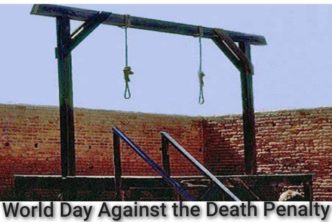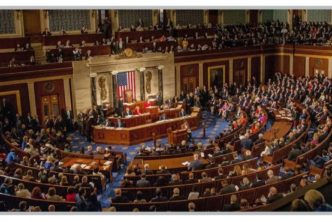March 14, 2006, 10:42 a.m.
Fisk Vick, Again
A warped view of Iran.
Michael Ledeen
NRO contributing editor
As part of its relentless campaign to blame all of mankind’s misfortunes on George W. Bush, today the Washington Post unleashed Karl Vick (my candidate for the Walter Duranty Memorial Prize) and David Finkel on American efforts to help Iranians who dare to challenge the mullahs. “U.S. Push for Democracy Could Backfire Inside Iran,” screams the front-page headline, and the policy point of the article is nicely contained in the first paragraph:
Prominent activists inside Iran say President Bush’s plan to spend tens of millions of dollars to promote democracy here is the kind of help they don’t need, warning that mere announcement of the U.S. program endangers human rights advocates by tainting them as American agents.
Some Iranian dissidents attended workshops in Dubai last spring, and, with that ominous vagueness that so often characterizes reporting on things Iranian, at “about the time” that the administration announced it would support pro-democracy forces inside Iran, they were arrested. The Post seems not to have inquired about the treatment inside the regime’s prisons, but Vick and Finkel got a catchy quotation from Emad Baghi: “We are under pressure here both from hard-liners in the judiciary and that stupid George Bush.”
I love the moral equivalence: Bush wants to help them acquire freedom, while the regime (neatly reduced to a couple of bad guys in the Ministry of Injustice) crushes them. And Bush is the stupid one.
If you read carefully, you will notice that the unfortunate Mr. Baghi is not exactly free to speak his own mind, since his wife and daughter were in jail, undergoing interrogation. Baghi excoriates Bush for helping “outside groups and we’re in here suffering.”
So, in keeping with the paradigm established by Walter Duranty — the man who never found Stalin the least bit objectionable — Vick/Finkel blame Bush for the ongoing savagery of the Islamic republic. No matter that pro-democracy dissidents have been arrested, tortured, and murdered for 27 long years in Iran; the actions of the regime are simply blamed on Bush. “You know what a vulnerable situation we have here in Iran,” Baghi says, “It was not a good thing to invite us to such a workshop.”
Really? But Baghi and others still went to it, because they would be able to learn the lessons of the many successful non-violent democratic revolutions that have swept the world since 1975. They knew it was risky — Baghi was incarcerated for three years in the ’90s, after all — but they were willing to take that risk. Even strong men can be broken, especially when their wives and daughters are in the hell holes of Tehran’s infamous prisons, and they can be convinced or compelled to renounce their ideals in order to save the lives of their women. No news here. Just ask those doomed Soviet citizens who “confessed” at Stalin’s show trials.
Vick and Finkel go out of their way to tell us that there is no hope of popular insurrection in Iran today, and carefully quote a failed “reformist” saying that nothing good can come from outside help (even though it is hard to find a successful revolution, including our own, that did not have an outside base of support), and that, even if there were hope at one time, that moment has passed. The regime has won: “[T]he capacity for civil society is so depleted that homeowners cannot be bothered to protest the cutting of trees in an eastern Tehran park to make way for a freeway extension.”(I wonder if this refers to the thousands of trees cut down in order to hide any evidence of seepage of nuclear materials from an underground facility.)
It’s hilarious that Vick and Finkel would offer this tolerated ecological “violence” to show that resistance to the regime is weakened, when, as they wrote, thousands of workers were recently demonstrating against the regime, from Tehran to Khuzestan. Nor do we hear about the bravery of Iranian women, who just last week demonstrated in Tehran and were clubbed, slashed, and incarcerated. They knew it would happen, but were willing to sacrifice themselves to show their own courage and the regime’s ferocity. But such news would undermine the whole thrust of the Post’s latest effort at agitprop, so we don’t hear anything about anti-regime protests, even though they are the true background to all events in contemporary Iran.
The real story is in today’s New York Sun, increasingly our newspaper of record. Eli Lake interviewed one of the organizers of the workshop, who lays it out clearly: “[H]e fears that the state is trying to extract a confession through torture from Ali Afsahi [a journalist who attended two workshops in Dubai] to misrepresent the aims of the session.” And in fact, it seems that Afsahi approached the Post to help Vick/Finkel slime Bush and the dissidents. Like Baghi, Afsahi wasn’t exactly free to speak his own mind. As Lake tells us, Afsahi’s wife “only received a phone call from him on Sunday and…he was crying.” Lots of brave Iranians are crying, but lots of brave Iranians are now encouraged to see that at long last the United States is helping them.
Only Lake bothers to point out that one of the workshops, organized by the estimable Peter Ackerman’s International Center for Nonviolent Conflict, was entirely private. Not a penny of money from “stupid Bush.” But of course, the mullahs don’t go in for such distinctions; as always, they lash out at anyone who dares question the legitimacy of their regime.
Back in the Cold War, those of us who supported the Bukovskys and the Sharanskys were often told by the Walter Durantys of that time that we were fools, because we were only making things worse for the dissidents. But they were the real fools, and morally corrupt fools at that. So will it be today, provided that George W. Bush and his people have the tenacity to join this epic struggle, which uniquely fuses high virtue with fundamental national security.
Faster, please.
— Michael Ledeen, an NRO contributing editor, is most recently the author of The War Against the Terror Masters. He is resident scholar in the Freedom Chair at the American Enterprise Institute




